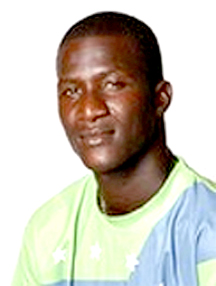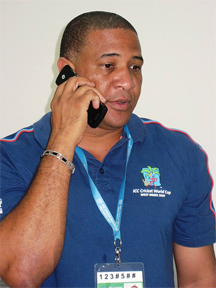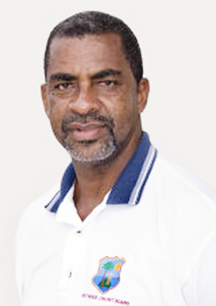The West Indies selectors, with the support of head coach Otis Gibson and board chief executive Ernest Hilaire, have made a couple of bold decisions these past six months.
The appointment of Darren Sammy as captain “until the end of the Digicel Series 2011” and the more recent simultaneous omissions from the early matches of the current Pakistan series of Shivnarine Chanderpaul, Chris Gayle and Ramnaresh Sarwan, the team’s only three batsmen with genuine credentials of record and experience, were carefully considered judgments.
They were also clearly fraught with awkward consequences that are now surfacing, both on and off the field, once more undermining the already shaky foundations of West Indies cricket.

Daring action is urgently needed to prevent further damage, even if that means finding ways of reversing earlier conclusions. Unfortunately, that would involve intransigent men on both sides of what has become a gaping divide and is unlikely to happen.
Last October, without an obvious candidate for the captaincy following the rejection of central contracts by the incumbent, Gayle, and his deputy, Dwayne Bravo, selectors and board turned to Sammy.
“We are at the dawn of a new era in West Indies cricket and the selection committee has entrusted the challenging job of captaincy to Darren Sammy because it is believed that he has demonstrated the attributes of a leader of this diverse group of men,” chief selector Clyde Butts said at the time.
Such perceived qualities had placed Sammy in the frame earlier in the year when he led a West Indies team, that included both Chanderpaul and Sarwan, for minor, nonetheless official, ODIs against Canada and Ireland in the Jamaica Festival.

An all-rounder only in the context of the present state of West Indies cricket, Sammy had not previously secured a steady place in the team but the decisions of Gayle and Bravo to go free-lance and the previous resignations of Chanderpaul and Sarwan from leadership roles left the selectors’ cupboard all but bare.
In the circumstances, Sammy seemed a tolerable choice – except for the astonishing addendum that guaranteed him the position for nine months.
In effect, it meant that, whatever his performance as skipper or player and however much it upset the balance of the 11, he would remain at the helm from November through July.
In that time, there was the tour of Sri Lanka, the World Cup and the home series against Pakistan and India, a total of eight Tests, 21 ODIs (reduced to 19 by rain in Sri Lanka) and a couple of T20 Internationals.
It was an unprecedented vote of confidence accorded to no previous captain and placed a heavy and unreasonable responsibility on Sammy.
With little experience and a modest background, he had to lead a team floundering for years in choppy waters and against the strong cross currents of constant infighting between the board and the players association.
He is not the first to be overwhelmed by the task.

Richie Richardson came down with acute fatigue syndrome during his time. Brian Lara quit after his first two years to seek professional help. Never at ease, Chanderpaul, too, packed it in to concentrate on his batting.
The difference is that there was never any doubt about their places. Sammy doesn’t have that luxury, even less so now that his returns with bat and ball have markedly dipped.
In spite of his protestations to the contrary, the evidence mounts that the task has taken its toll on his cricket.
After the Tests in Sri Lanka (in which he averaged 8.33 with the bat, 75.5 with the ball), Gibson acknowledged that “it’s been tough for him.”
Returning home after the quarter-final elimination from the World Cup, Sammy pleaded he was mentally and physically exhausted. Instead of turning out to lead the Windward Islands in the semi-final of the four-day competition, he sought necessary rest and relaxation in Miami.
Gibson said he has tried to convince him to “be his own man…not to think that he suddenly has to be the best batsman, the best bowler, the best fielder.”
“The main thing is to be a good leader,” the coach added.
He probably has been that. His tactics are sound and he seems to have the backing of his players.
The problem is that his diminishing returns have upset the stability of the team and affected his own self confidence, as was obvious in Thursday’s third ODI at Kensington Oval.
In order to accommodate the captain and an additional fast bowler, the specialist wicket-keeper, Carlton Baugh, was dropped and Lendl Simmons, no more than a part-timer, given the gloves.
Yet, on a bouncy pitch on which Ravi Rampaul ripped through Pakistan’s top order, Sammy, even with his height, confined himself to two overs.
By all cricketing reasoning, the selectors would now be seeking a new captain. Unless Sammy himself decides to step down – as Richardson, Lara and Chanderpaul did – Butts and his panel would have to go back on its original opinion to replace him. That is doubtful.
Indeed, they and Sammy himself, as a member of the panel, could take much of the blame for the faltering batting that has led to the three successive defeats in the ODI series against Pakistan.
Between them, they chose to omit Gayle (it subsequently transpires fitness was the cause even though it did not seem an issue as he headed for the IPL and slammed a hundred in his first innings), Sarwan and Chanderpaul all at the same time. In their stead came Lendl Simmons and Marlon Samuels, a couple seeking to resurrect careers after erratic pasts, and Kirk Edwards, a complete newcomer.
The board explained that it was “consistent with the policy to expose young players.”
Even given that Samuels is 30 with eight years on his international clock and that Simmons, 27, first appeared in West Indies colours in 2006, it was a back to front policy.
For all Gibson’s criticism of the senior players in the World Cup, there is no substitute for experience, especially in a team so short of it. The rotation that Hilaire spoke of as part of the selection plan was best applied to the “young players.”
The recall of Sarwan for tomorrow’s fourth ODI is instructive. Chanderpaul must follow in the Tests, providing that his very open and, for him, surprisingly acrimonious row with Hilaire doesn’t get in the way.
It is that rumpus, and the others, involving Gayle and Sarwan, only slightly less bitter than Chanderpaul’s, that have once more dominated the media and superceded the cricket.
Nor is there any sign that they will ever end or that West Indies cricket will restore its integrity, no matter who is captain.
The leaders who count are not so much on the field but on the West Indies Cricket Board (WICB) and the West Indies Players Association (WIPA). No one has yet managed to get them to change their attitudes to each other. The prospects remain gloomy.




